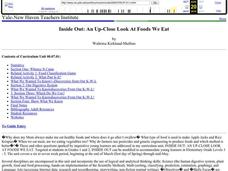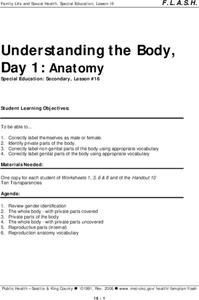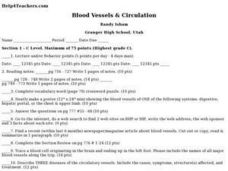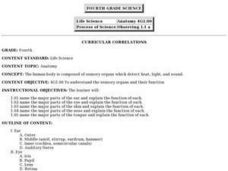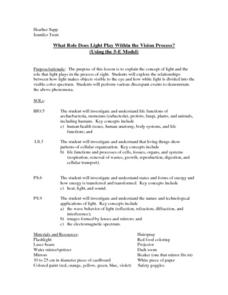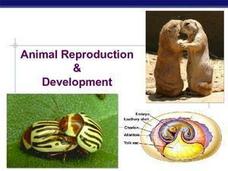Curated OER
Biology Wordsearch
For this biology worksheet, students identify and locate various vocabulary terms found in a biology lesson. There are 39 biology terms located in the word search.
Curated OER
Freshmen Biology Terms
For this biology worksheet, 9th graders identify and locate various vocabulary terms pertaining to ninth grade biology. There are 48 biology terms located in the word search.
ProCon
Vegetarianism
What do Mike Tyson, Ellen DeGeneres, and Paul McCartney have in common? They're all famous vegetarians. Using the resource, scholars learn about the pros and cons of eating a vegetarian diet. They read a fascinating history of...
Curated OER
Good Food, Good Health
Learners investigate how food provides energy for the human body. In this physical health instructional activity, students access online resources to identify how certain foods can affect their health. Learners discuss how many servings...
Curated OER
It's All About Me!
Students study the five major body system in this unit. They examine how to keep themselves healthy.
Chymist
Landfills and Recycling
Examine the nature of landfills through experimentation. Scholars build miniature landfills and monitor changes over a six-week period. Observations allow individuals to draw conclusions about the different types of trash and their...
Curated OER
Getting Up the Nerve
Students examine the basics of the nervous system through an interactive program. They discover how the brain is linked to muscle movement. They can test cells through the interactive program to see how it reacts to different stimuli.
Curated OER
Inside Out: An Up-Close Look At Foods We Eat
Fourth graders identify the origins of meats and vegetables consumed by humans on a daily basis. They classify foods (meats, dairy products, grains...) and create a food pyramid.
Serendip
How Do Biological Organisms Use Energy?
When an organism eats, how does food become energy? Young biologists follow glucose through the process of cellular respiration to the creation of ADP using a discussion-based activity. The resource also highlights conservation of mass...
Curated OER
Non-Nutrients: Fiber and Water
Learners discuss how much fiber and water a person needs each day. They use beans soaked in water to show the benefits of water to the human body. They also learn the health benefits to eating healthy.
Curated OER
Diversity And Adaptations Of Organisms
Seventh graders demonstrate the processes of science by posing questions and investigating phenomena through language, methods and instruments of science. They study the body features or systems of several animals.
Curated OER
Nutrition 3: Got Broccoli?
Students discover why the human body needs food in order to survive. In groups, they analyze advertising for the foods they eat the most and try to identify the nutritional value of them as well. They complete a worksheet showing them...
Curated OER
Understanding the Body, Day 1: Anatomy
High schoolers review gender identification and label themselves female or male. They identify the parts of the human body and practice using appropriate vocabulary. They complete a worksheet to complete the lesson.
Curated OER
Blood
In this blood learning exercise, students describe the four functions of blood. Then they write what each part of the human body illustrated does below the picture. Students also complete the table on possible blood types of a receiver...
Curated OER
Blood Vessels & Circulation
Students participate in a layered curriculum designed lesson in order to study the cardiovascular system of the human body. The assessments and activities are student centered.
Curated OER
Anatomy
Fifth graders identify and describe the functions of the major body systems. They discover how to maintain a healthy lifestyle with proper nutrition and exercise. They answer comprehension questions to end the lesson.
Curated OER
Cows, Worms, and Compost
Students study decomposition. In this decomposition lesson, students discuss the background information about decomposition. Students then complete the 'Chew It Twice' worksheet.
Curated OER
How do Hypotonic, Hypertonic, and Isotonic Solutions Affect the Water Movement of a Cell?
After removing the shell from a raw egg, cell biologists soak the egg in either a hypotonic, hypertonic, or isotonic corn syrup solution. They calculate the percent change in mass and compare it to the strength of the solution in a...
Curated OER
What Role Does Light Play Within the Vision Process?
Students are introduced to the relationship between light and vision. In groups, they participate in experiments to discover how different wavelengths are divided in the visible spectrum. They record their answers and discuss their...
Curated OER
Animal Reproduction and Development
Details of fertilization, cleavage, the placenta and fetal development are presented, along with important diagrams and illustrations. By using these slides, you and your students will generate discussion points, along with details...
Curated OER
Non-nutrients: Fiber and Water
Students will identify the sources and function of carbohydrates and fiber and apply appropriate food preparation techniques.
Curated OER
The Perfect Cow?
High schoolers examine how cattle have evolved through natural selection and selective breeding. In this natural selection lesson students compare and contrast natural and artificial selection.
Curated OER
Pandemic
Students examine contagious diseases. They explore different types of bacteria and the illnesses they cause.
Curated OER
Testing for Life’s Molecules
Want to hear a joke about sodium? Na. Young scientists test various materials to identify if they include protein, starch, and glucose by using the Biuret test, iodine starch test, and Benedict's test respectively. After practicing with...
Other popular searches
- Human Digestive System Songs
- Human Digestive System Poems
- Human Digestive System Quiz
- Human Biology Digestion
- Human Digestive System Corn
- The Human Digestive System









